外研版(2019)必修第一册Unit 2 Exploring English Listening and Speaking听说课课件(共21张PPT)
文档属性
| 名称 | 外研版(2019)必修第一册Unit 2 Exploring English Listening and Speaking听说课课件(共21张PPT) | 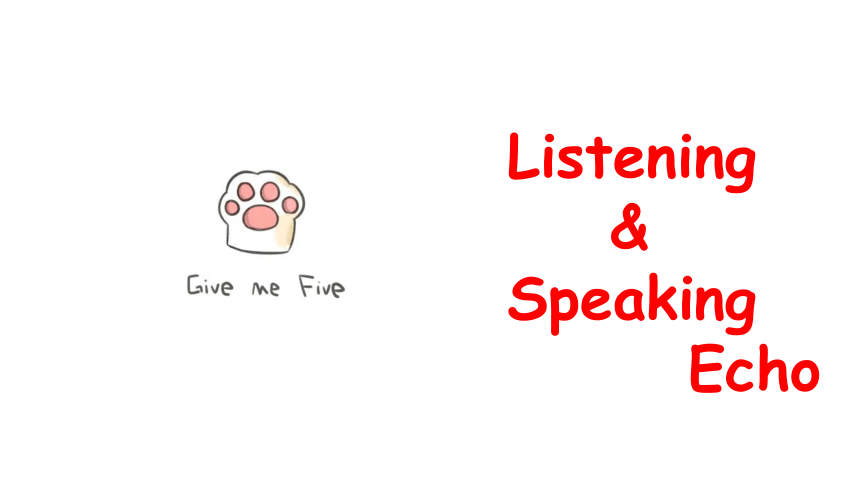 | |
| 格式 | pptx | ||
| 文件大小 | 4.5MB | ||
| 资源类型 | 教案 | ||
| 版本资源 | 外研版(2019) | ||
| 科目 | 英语 | ||
| 更新时间 | 2022-10-11 21:22:59 | ||
图片预览

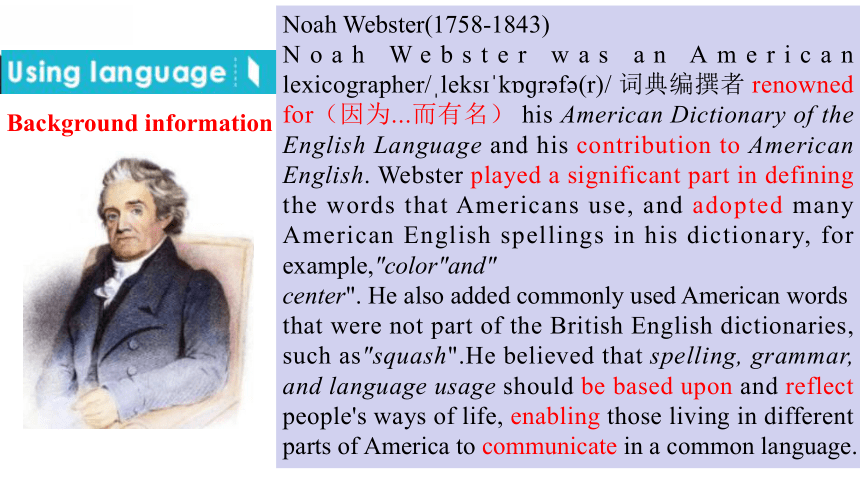
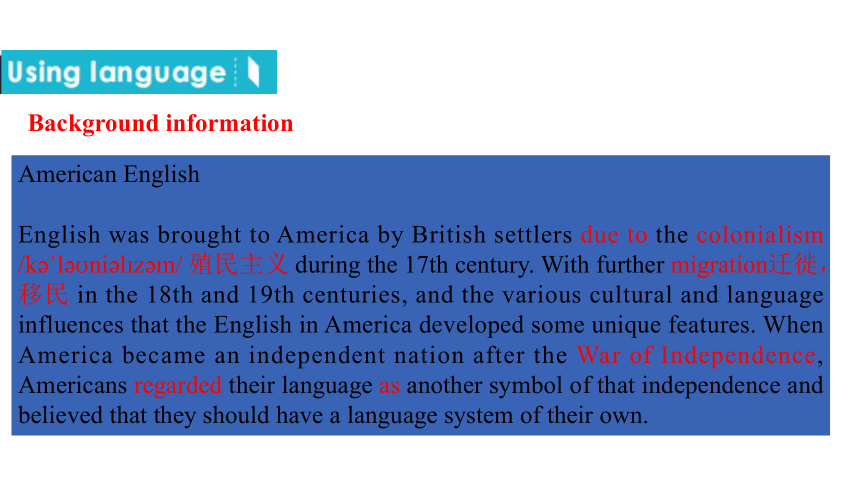
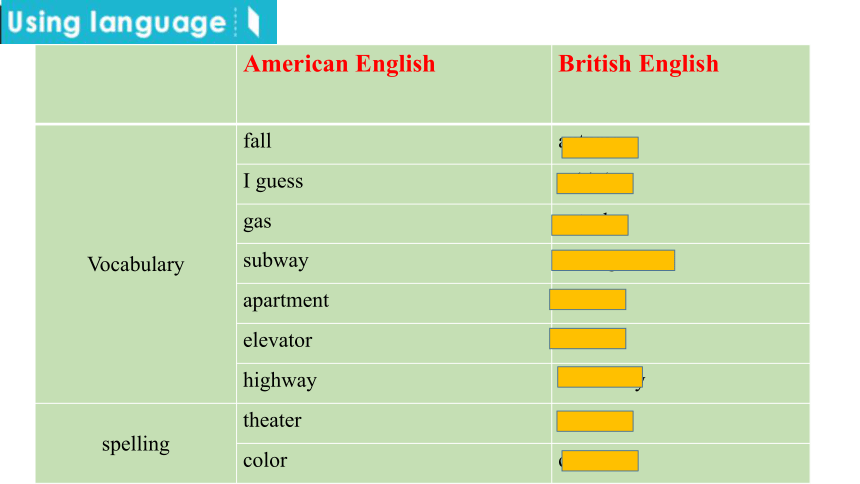
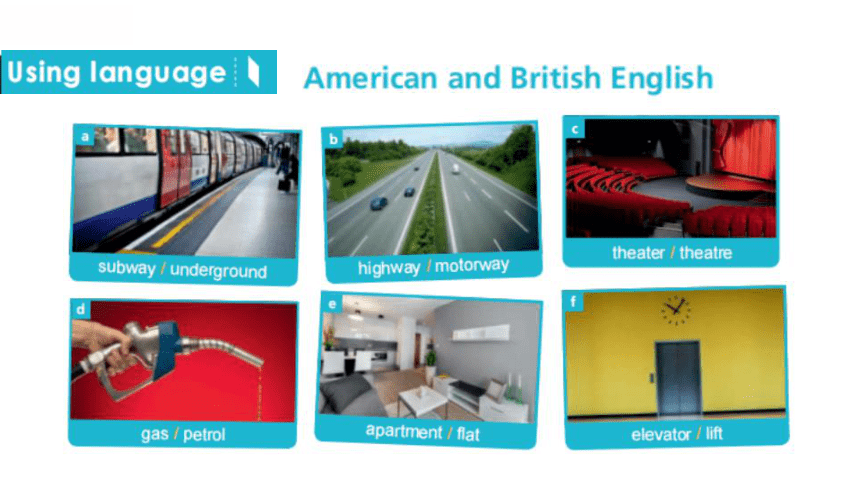
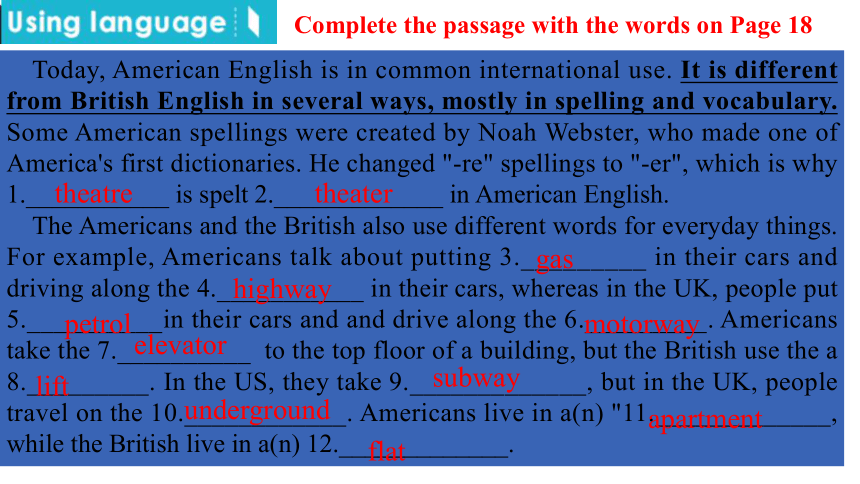
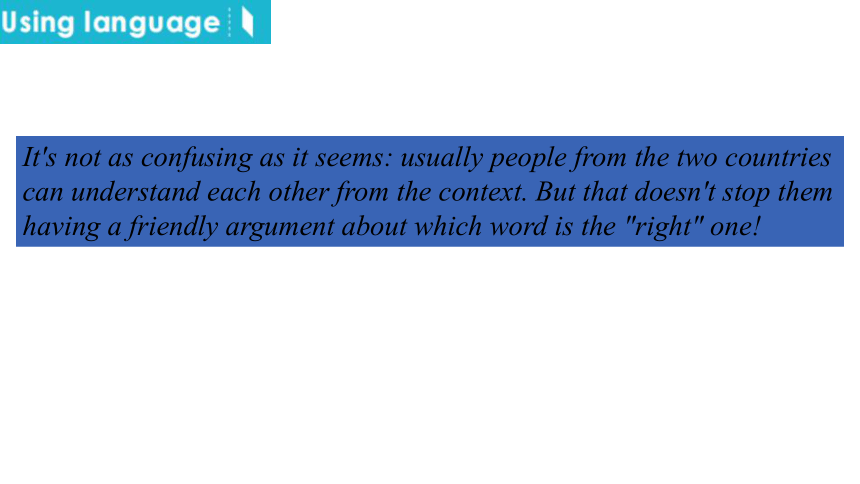
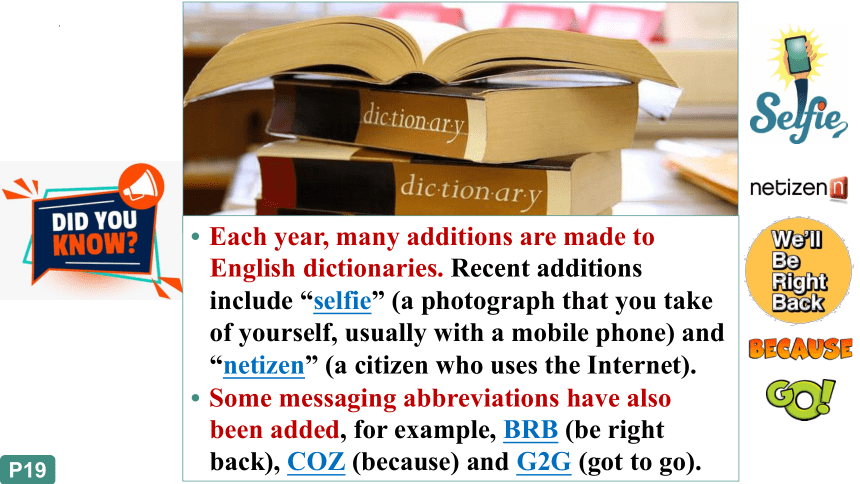
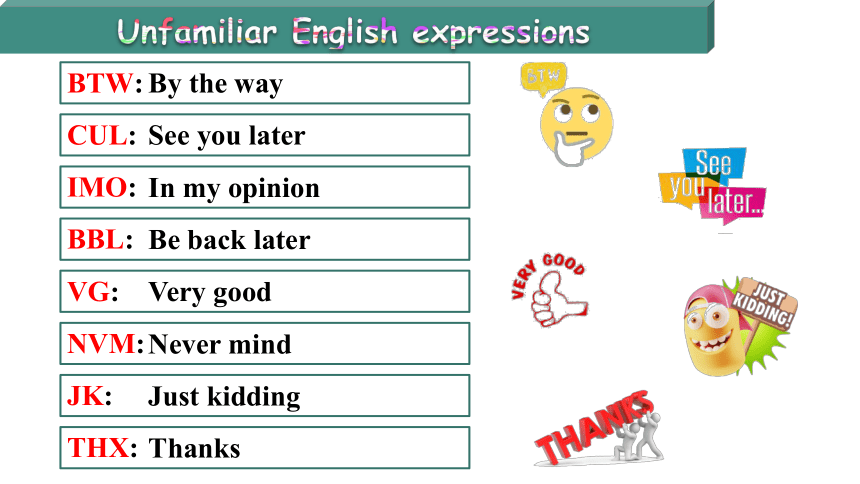
文档简介
(共21张PPT)
Listening
&
Speaking
Echo
Background information
Noah Webster(1758-1843)
Noah Webster was an American lexicographer/ leks k ɡr f (r)/ 词典编撰者 renowned for(因为...而有名) his American Dictionary of the English Language and his contribution to American English. Webster played a significant part in defining the words that Americans use, and adopted many American English spellings in his dictionary, for example,"color"and"
center". He also added commonly used American words that were not part of the British English dictionaries, such as"squash".He believed that spelling, grammar, and language usage should be based upon and reflect people's ways of life, enabling those living in different parts of America to communicate in a common language.
Background information
American English
English was brought to America by British settlers due to the colonialism /k l ni l z m/ 殖民主义 during the 17th century. With further migration迁徙,移民 in the 18th and 19th centuries, and the various cultural and language influences that the English in America developed some unique features. When America became an independent nation after the War of Independence, Americans regarded their language as another symbol of that independence and believed that they should have a language system of their own.
American English British English
Vocabulary fall autumn
I guess I think
gas petrol
subway underground
apartment flat
elevator lift
highway motorway
spelling theater theatre
color colour
Complete the passage with the words on Page 18
Today, American English is in common international use. It is different from British English in several ways, mostly in spelling and vocabulary. Some American spellings were created by Noah Webster, who made one of America's first dictionaries. He changed "-re" spellings to "-er", which is why 1.___________ is spelt 2._____________ in American English.
The Americans and the British also use different words for everyday things. For example, Americans talk about putting 3._________ in their cars and driving along the 4.___________ in their cars, whereas in the UK, people put 5.__________in their cars and and drive along the 6._________. Americans take the 7.__________ to the top floor of a building, but the British use the a 8._________. In the US, they take 9._____________, but in the UK, people travel on the 10.____________. Americans live in a(n) "11._____________, while the British live in a(n) 12._____________.
theatre
theater
gas
highway
petrol
motorway
elevator
lift
subway
underground
apartment
flat
It's not as confusing as it seems: usually people from the two countries can understand each other from the context. But that doesn't stop them having a friendly argument about which word is the "right" one!
P19
· Each year, many additions are made to
English dictionaries. Recent additions
include “selfie” (a photograph that you take
of yourself, usually with a mobile phone) and
“netizen” (a citizen who uses the Internet).
· Some messaging abbreviations have also
been added, for example, BRB (be right
back), COZ (because) and G2G (got to go).
THX:
NVM:
IMO:
CUL:
BTW:
Thanks
Unfamiliar English expressions
BBL:
VG:
JK:
By the way
See you later
In my opinion
Very good
Never mind
Be back later
Just kidding
Listen to three conversations and match them to the pictures.
P19 6
a
b
c
a: ______________
b: ______________
c: ______________
Conversation 3
Conversation 1
Conversation 2
Listening Skill:
Try to get the keywords.
Listen again and complete the table.
P19 7
Words Meaning Origin
dim sum a kind of traditional 1____________ from 2_______
________________
3_______ using a cellphone without caring about others a combination of the words 4__________ and 5_______
6_______ a shorter way of saying 7______________ from the Internet
Chinese food
the Guangdong dialect
cellfish
cellphone
selfish
LOL
“laugh out loud”
“league of legends”
How do the speakers ask for and explain the meanings of the words
(Underline the sentences they use )
P19 7
Listen again if necessary.
(P19) Tapescript:
Conversation 1
A: I'm going to buy something to eat from the restaurant downstairs.
Would you like anything
B: Oh yes, please. Could you order me some dim sum
A: Some what
B: Dim sum.
A: What kind of food is that
B: It's a kind of traditional Chinese food from South China,
including dumplings, spring rolls, meatballs and so on.
A: Oh, I see. So “dim sum” comes from Chinese
B: Yes, that's right. In fact, it comes from the Guangdong dialect.
In Mandarin or Putonghua it would be “dian xin”.
A: Well, it sounds good! Maybe I'll order that as well…
Conversation 2
A: How was the movie
B: It was great, but someone in front of me was talking so loudly on her phone.
A: How cellfish!
B: Yes, I agree. Very selfish.
A: Ah, do you know what I mean by “cellfish”
B: Of course! When you say “selfish”, you mean only caring about yourself
and not about other people, right
A: That's what “selfish” with an “s” means, but I'm talking about “cellfish”
starting with the letter “c”.
B: I haven't heard that word before. What does it mean
A: It means using a cellphone in a way that shows you don't care about the
other people around you.
B: That's interesting. How do you spell it
A: C-E-L-L-F-I-S-H. It's the words “cellphone” and “selfish” put together.
B: Oh, I see…
Conversation 3
[SFX of someone pressing mobile phone keys, followed by a chime indicating a new message]
A: Darling, could you take a look at this message from Lucy
I have no idea what she's talking about…again.
B: What has she said
A: Well, I told her a joke that Bob told me today at the office, and,
as you see, she replied “LOL”. What's that for
B: Oh, LOL! It's a shorter way of saying “laugh out loud”.
A: I've never seen or heard that before. Where does it come from
B: It was first used on the Internet. You use it to show you think
something is very funny.
A: Oh, okay.
B: Keep up with the times, darling!
How do the speakers ask for and explain the meanings of the words
Useful expressions:
What kind of food is that
It's a kind of…
Do you know what I mean by…
It means…
What's that for
It's…
Where does it come from
It was first used…
Listen again if necessary.
StudentA:
You are asking for the bill in a restaurant. The waiter / waitress asks you if you need a doggy bag. You don't know what it is and ask him / her to explain.
StudentB:
You are a waiter / waitress in a restaurant. You ask your customer whether he / she needs a doogy bag.
(Notes: A “doggy bag” is a bag or box in which you
take unfinished food home from a restaurant.)
Act out the conversation to ask for and explain the meanings of the expressions.
Situation 1:(G1-G4)
□ Useful expressions
StudentA
I beg your pardon
What does … mean
What's that for
When you say … you mean …, right
StudentB
It means…
You use it to…
StudentA:
You see a sign in a supermarket saying “3 for 2”.
You don't know what it means and ask the shop assistant to explain.
StudentB:
You are a shop assistant. A customer asks you what “3 for 2” means.
(Notes: “3 for 2” means that if you buy two items, you get a third one for free.)
Act out the conversation to ask for and explain the meanings of the expressions.
Situation 2:(G5-G8)
□ Useful expressions
StudentA
I beg your pardon
What does … mean
What's that for
When you say … you mean …, right
StudentB
It means…
It's a shorter way of saying…
Show Time
Some of the language used on the Internet is different to the language used in other forms of communication. It may be a quick and, to you, clear way to communicate, but before you use it, stop and think: who do you want to communicate with and why Make sure that any abbreviations and emojis you use are appropriate for the situation, and consider whether your readers will even know what you mean by BRB or COZ.
Conclusion
Read and Review
Listening
&
Speaking
Echo
Background information
Noah Webster(1758-1843)
Noah Webster was an American lexicographer/ leks k ɡr f (r)/ 词典编撰者 renowned for(因为...而有名) his American Dictionary of the English Language and his contribution to American English. Webster played a significant part in defining the words that Americans use, and adopted many American English spellings in his dictionary, for example,"color"and"
center". He also added commonly used American words that were not part of the British English dictionaries, such as"squash".He believed that spelling, grammar, and language usage should be based upon and reflect people's ways of life, enabling those living in different parts of America to communicate in a common language.
Background information
American English
English was brought to America by British settlers due to the colonialism /k l ni l z m/ 殖民主义 during the 17th century. With further migration迁徙,移民 in the 18th and 19th centuries, and the various cultural and language influences that the English in America developed some unique features. When America became an independent nation after the War of Independence, Americans regarded their language as another symbol of that independence and believed that they should have a language system of their own.
American English British English
Vocabulary fall autumn
I guess I think
gas petrol
subway underground
apartment flat
elevator lift
highway motorway
spelling theater theatre
color colour
Complete the passage with the words on Page 18
Today, American English is in common international use. It is different from British English in several ways, mostly in spelling and vocabulary. Some American spellings were created by Noah Webster, who made one of America's first dictionaries. He changed "-re" spellings to "-er", which is why 1.___________ is spelt 2._____________ in American English.
The Americans and the British also use different words for everyday things. For example, Americans talk about putting 3._________ in their cars and driving along the 4.___________ in their cars, whereas in the UK, people put 5.__________in their cars and and drive along the 6._________. Americans take the 7.__________ to the top floor of a building, but the British use the a 8._________. In the US, they take 9._____________, but in the UK, people travel on the 10.____________. Americans live in a(n) "11._____________, while the British live in a(n) 12._____________.
theatre
theater
gas
highway
petrol
motorway
elevator
lift
subway
underground
apartment
flat
It's not as confusing as it seems: usually people from the two countries can understand each other from the context. But that doesn't stop them having a friendly argument about which word is the "right" one!
P19
· Each year, many additions are made to
English dictionaries. Recent additions
include “selfie” (a photograph that you take
of yourself, usually with a mobile phone) and
“netizen” (a citizen who uses the Internet).
· Some messaging abbreviations have also
been added, for example, BRB (be right
back), COZ (because) and G2G (got to go).
THX:
NVM:
IMO:
CUL:
BTW:
Thanks
Unfamiliar English expressions
BBL:
VG:
JK:
By the way
See you later
In my opinion
Very good
Never mind
Be back later
Just kidding
Listen to three conversations and match them to the pictures.
P19 6
a
b
c
a: ______________
b: ______________
c: ______________
Conversation 3
Conversation 1
Conversation 2
Listening Skill:
Try to get the keywords.
Listen again and complete the table.
P19 7
Words Meaning Origin
dim sum a kind of traditional 1____________ from 2_______
________________
3_______ using a cellphone without caring about others a combination of the words 4__________ and 5_______
6_______ a shorter way of saying 7______________ from the Internet
Chinese food
the Guangdong dialect
cellfish
cellphone
selfish
LOL
“laugh out loud”
“league of legends”
How do the speakers ask for and explain the meanings of the words
(Underline the sentences they use )
P19 7
Listen again if necessary.
(P19) Tapescript:
Conversation 1
A: I'm going to buy something to eat from the restaurant downstairs.
Would you like anything
B: Oh yes, please. Could you order me some dim sum
A: Some what
B: Dim sum.
A: What kind of food is that
B: It's a kind of traditional Chinese food from South China,
including dumplings, spring rolls, meatballs and so on.
A: Oh, I see. So “dim sum” comes from Chinese
B: Yes, that's right. In fact, it comes from the Guangdong dialect.
In Mandarin or Putonghua it would be “dian xin”.
A: Well, it sounds good! Maybe I'll order that as well…
Conversation 2
A: How was the movie
B: It was great, but someone in front of me was talking so loudly on her phone.
A: How cellfish!
B: Yes, I agree. Very selfish.
A: Ah, do you know what I mean by “cellfish”
B: Of course! When you say “selfish”, you mean only caring about yourself
and not about other people, right
A: That's what “selfish” with an “s” means, but I'm talking about “cellfish”
starting with the letter “c”.
B: I haven't heard that word before. What does it mean
A: It means using a cellphone in a way that shows you don't care about the
other people around you.
B: That's interesting. How do you spell it
A: C-E-L-L-F-I-S-H. It's the words “cellphone” and “selfish” put together.
B: Oh, I see…
Conversation 3
[SFX of someone pressing mobile phone keys, followed by a chime indicating a new message]
A: Darling, could you take a look at this message from Lucy
I have no idea what she's talking about…again.
B: What has she said
A: Well, I told her a joke that Bob told me today at the office, and,
as you see, she replied “LOL”. What's that for
B: Oh, LOL! It's a shorter way of saying “laugh out loud”.
A: I've never seen or heard that before. Where does it come from
B: It was first used on the Internet. You use it to show you think
something is very funny.
A: Oh, okay.
B: Keep up with the times, darling!
How do the speakers ask for and explain the meanings of the words
Useful expressions:
What kind of food is that
It's a kind of…
Do you know what I mean by…
It means…
What's that for
It's…
Where does it come from
It was first used…
Listen again if necessary.
StudentA:
You are asking for the bill in a restaurant. The waiter / waitress asks you if you need a doggy bag. You don't know what it is and ask him / her to explain.
StudentB:
You are a waiter / waitress in a restaurant. You ask your customer whether he / she needs a doogy bag.
(Notes: A “doggy bag” is a bag or box in which you
take unfinished food home from a restaurant.)
Act out the conversation to ask for and explain the meanings of the expressions.
Situation 1:(G1-G4)
□ Useful expressions
StudentA
I beg your pardon
What does … mean
What's that for
When you say … you mean …, right
StudentB
It means…
You use it to…
StudentA:
You see a sign in a supermarket saying “3 for 2”.
You don't know what it means and ask the shop assistant to explain.
StudentB:
You are a shop assistant. A customer asks you what “3 for 2” means.
(Notes: “3 for 2” means that if you buy two items, you get a third one for free.)
Act out the conversation to ask for and explain the meanings of the expressions.
Situation 2:(G5-G8)
□ Useful expressions
StudentA
I beg your pardon
What does … mean
What's that for
When you say … you mean …, right
StudentB
It means…
It's a shorter way of saying…
Show Time
Some of the language used on the Internet is different to the language used in other forms of communication. It may be a quick and, to you, clear way to communicate, but before you use it, stop and think: who do you want to communicate with and why Make sure that any abbreviations and emojis you use are appropriate for the situation, and consider whether your readers will even know what you mean by BRB or COZ.
Conclusion
Read and Review
